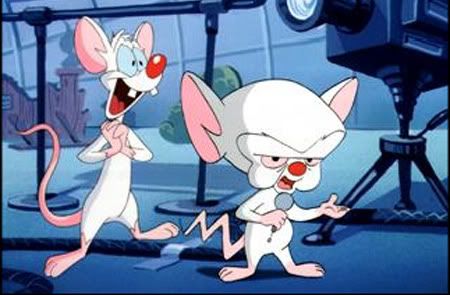
I trust that everyone remembers this (in)famous picture of what scientists do to animals. (I am neither condemning nor condoning--although I will say I fall more in the view that animal testings are okay, although I am conflicted when it comes to certain animals. I am a human being as you all are!)
So what has our esteemed scientists done now? Given mice speech.
http://www.msnbc.msn.com/id/30984848/
Okay, not really... yet. But we just may expect talking mice a few decades down the line. The story goes that apparently mice are very similar to human beings genetically, which is part of the reason we like to experiment with them. That and the fact that we can breed them like rabbits and human beings aren't as concerned with rodent cruelty as they are about primate cruelty.
"With this study, we get the first glimpse that mice can be used to study
not only disease, but also our own history."
Wolfgang Enard of the Max-Planck Institute for Evolutionary Anthrophology (and colleagues) are conducting a study about the evolution of human speech using lab mice. Science Jargons alert! Basically, scientists have found that in humans, there are two amino acid substitutes on the FOXP2 gene compared to chimps. This changes became fixed after we humans split off from the chimpanzees in the great tree of "Where did we come from?". The reason they theorize that this gene is responsible for how we came to have speech is that people who carry a nonfunctional version of the FOXP2 gene have impairments in the timing of the facial movement required for speech. This in turn suggests the gene is involved in the motor control of the lips, tongue and larynx required for speech.

Enter stage right: genetically altered mice.
Unfortunately, we won't be hearing littel adorable mice talking about taking over the world any time soon, but maybe in a few 10000's of years! (Or decades, considering how much shorter each mice generation is.)
The brain circuitry of these new mice have started to show changes that were previously linkd to human speech. And--apparently little mice babies send out distress calls when you take them away from mommy--their ultrasonic vocalizations are already showing changes.
However, let's not forget that we don't know enough about mouse communication to really understand how these changes really mean.
Nevertheless, I shall hold out hope that a few escape mice will eventually give rise to a new world where we can learn "mice-an."
In other news, beware the wrath of a woman scorned: http://www.mosnews.com/weird/2009/05/25/1909/

No comments:
Post a Comment